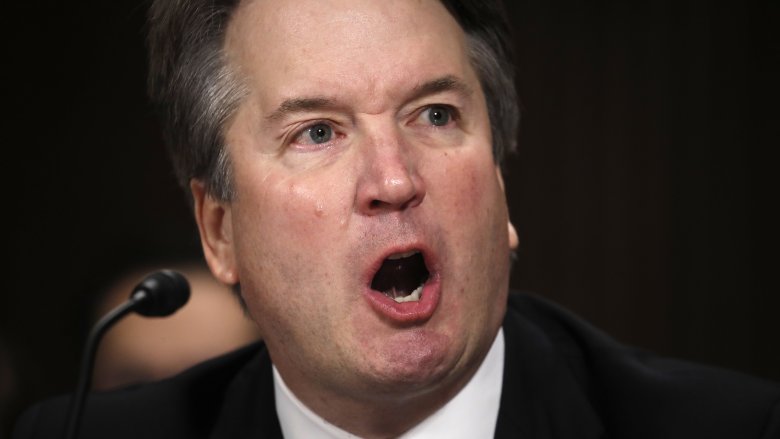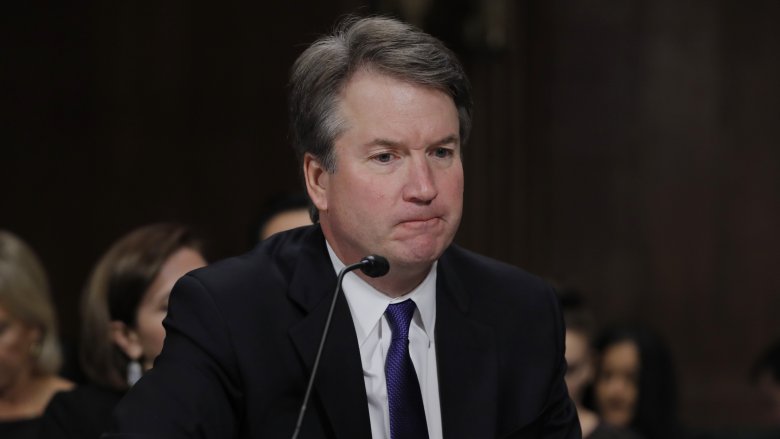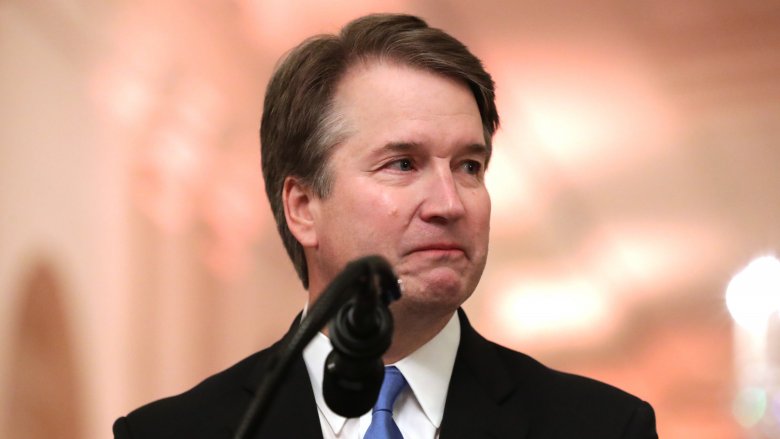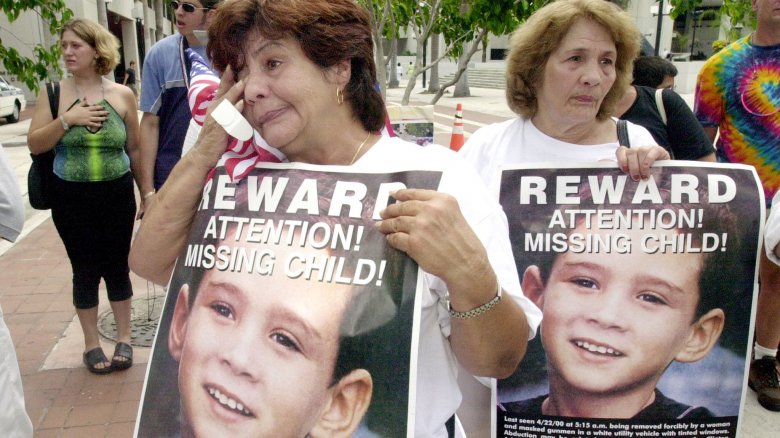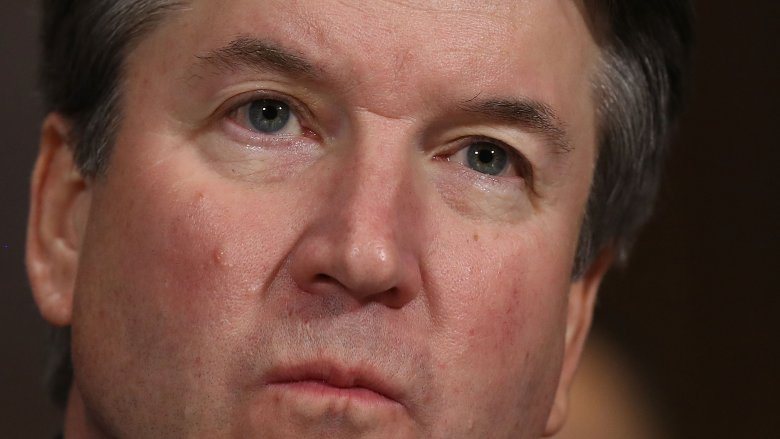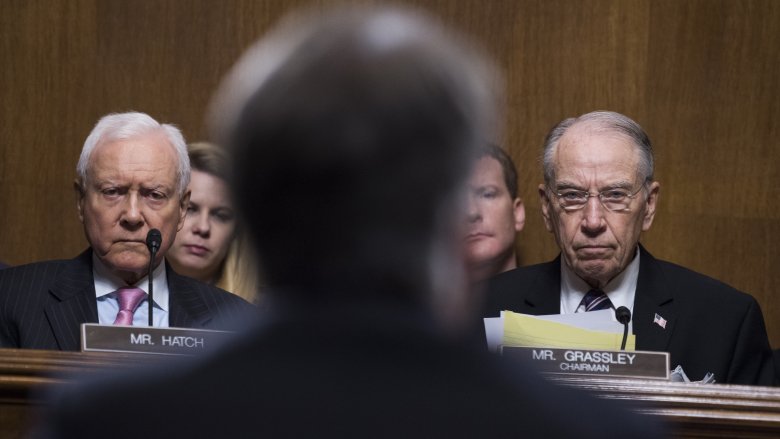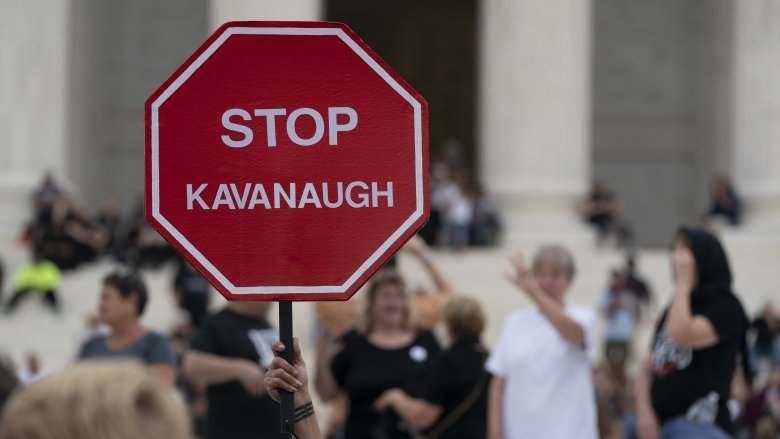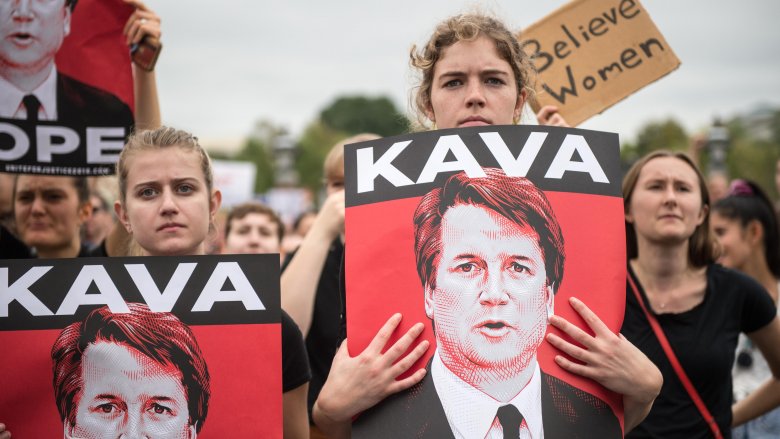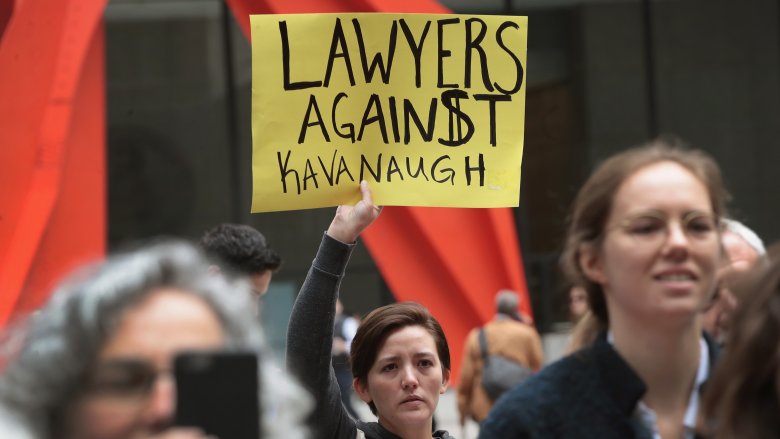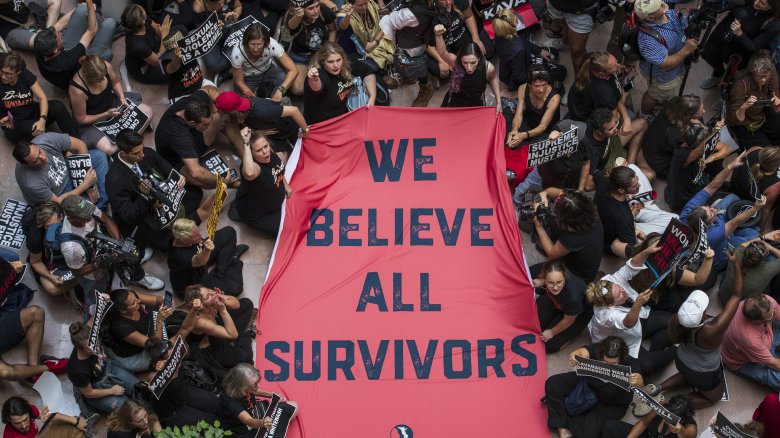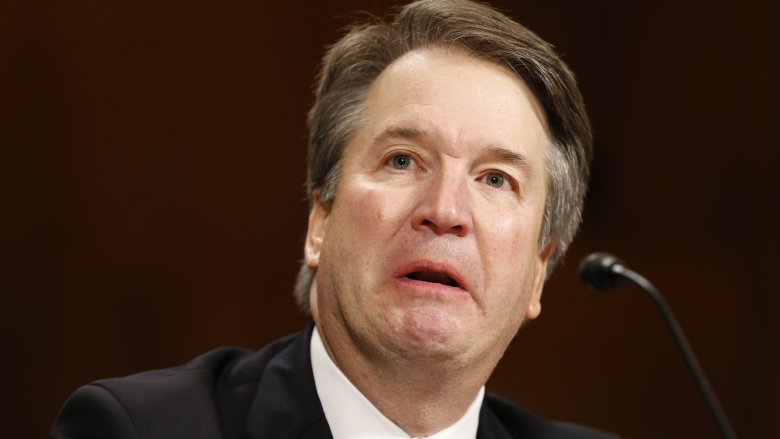The Untold Truth Of Brett Kavanaugh
On October 6, 2018, Brett Michael Kavanaugh became an associate justice of the Supreme Court of the United States, taking over for Anthony Kennedy, who retired in July 2018. You might have heard about it; it was kind of on the news a lot. But maybe you don't watch the news, so in that case, maybe you heard about it on John Oliver or Stephen Colbert or Jimmy Kimmel. Or maybe you just saw Kavanaugh portrayed by Matt Damon on Saturday Night Live, chugging water and shouting about beer and crying about calendars while Kate McKinnon as Lindsey Graham went into paroxysms about freedom.
If your information about Kavanaugh came from one of these sources, you likely mostly know about the Senate Judiciary Committee hearing addressing the allegations by Dr. Christine Blasey Ford that Kavanaugh had sexually assaulted her when the two were in high school in the early 1980s. This story, perhaps rightly, dominated the narrative about Kavanaugh, but it means that all some people know about the newest Supreme Court Justice is "Squee" and "the devil's triangle" and "Bart O'Kavanaugh" and sketchy calendars and incriminating yearbook photos.
If you want to know more about Kavanaugh, such as his record on major issues and noteworthy cases he's worked on, the good news is there's a lot. The bad news is, depending on how you feel about things, you might yearn for the good times of a "boofing" goof when you realize this relatively young judge is appointed to the SC for life. Strap in!
School mates
Part of the reason the Supreme Court has nine justices (though this number has ranged from six to ten over the course of U.S. history, as the Constitution does not dictate a set number of justices and allows Congress to decide) is to provide a wide variety of viewpoints on the most pressing cases in the public eye at any given time. In addition, as Mental Floss explains, there has for the last few decades been an effort from presidents of both parties to ensure that women, people of color, and Jewish judges have remained on the bench in order that the Supreme Court might maintain "balancing representation." This is why, for example, George H.W. Bush nominated Clarence Thomas when Thurgood Marshall retired. But even going back as far as George Washington, presidents have endeavored to find geographical balance among their nominees for the Supreme Court.
And what could be more balanced than two dudes that are the same age that went to the same high school at the same time nominated by the same president? As the New York Times explains, Brett Kavanaugh and Trump's other pick for the Supreme Court, Neil Gorsuch (remember him? He's the one who's not Merrick Garland), both attended Georgetown Preparatory School in the early 1980s. Georgetown Prep is "an elite Jesuit high school just outside Washington, D.C.," which was also the alma mater for Jerome H. Powell, Trump's appointee for chairman of the Federal Reserve in 2018. That'll look good on the recruitment brochures for G'town P, at least.
Rising Starr
Anyone who was at least 10 years old (and maybe even younger) in the '90s will surely remember the Monica Lewinsky scandal, in which President Bill Clinton was investigated by independent counsel Kenneth Starr to see whether Clinton had had an affair with a White House intern and, more importantly, whether he had committed an obstruction of justice in trying to cover it up. It was one of the biggest news stories of the '90s, and it dominated the news cycle for a long time, and for many kids in that decade, it was how they found out what oral sex was.
Anyway, it turns out that Brett Kavanaugh worked on that case. In fact, as the New York Times explains, Kavanaugh was one of the principal authors of the Starr report (the official document of the investigation released in 1998) and himself drafted the portion of the report that laid out the scheme for impeaching Clinton, laying out 11 possible grounds. He was also, notably, the one who pushed for aggressive and explicitly sexual questioning of Clinton during the investigation, so he is, in a very real way, the reason so many '90s kids learned what else a cigar can be used for from CNN. As it happens, Kavanaugh also worked with Starr on the Whitewater investigation (the scandal from the beginning of Clinton's administration), but in 2009 he "[argued] more forcefully against criminal investigations of sitting presidents," according to the NYT. Perhaps that helped him nail the interview.
A boy in a boat and a woman on life support
One of the major news stories of 2000 was that of Elian Gonzalez, a then-6-year-old boy from Cuba who had been found in the ocean after the boat carrying him and other Cuban refugees — including his mother — sank, leaving the child as the only survivor. Gonzalez was brought to Florida and put in the care of extended family members. Gonzalez's father, with the support of the Castro government, sought to have his son returned to him in Cuba. As the Palm Beach Post reveals, one of the many lawyers who fought to keep young Elian in the U.S. was one Brett Kavanaugh, who, despite knowing that the legal consensus was that the father's claim on custody would prevail, argued that Gonzalez should remain on American soil to make a political point. Considering that the issue of children of refugees being detained in the U.S. and separated from their parents has been a major point of contention within the Trump administration, Kavanaugh's history on the Gonzalez case might be relevant today, unless of course he's had an "actually, it's bad to investigate sitting presidents" change of heart on this issue, too.
The Post also points out that in 2005, when Congress passed a bill in the middle of the night stating that the braindead Terri Schiavo must be kept alive despite her husband's wishes, Kavanaugh — then the president's staff secretary — was the one who woke President Bush up so he could sign it into law, in case you were curious where Kavanaugh stands on right-to-die issues.
Bush's go-to guy
About eight months after the Elian Gonzalez case, Kavanaugh would find himself entrenched in an even bigger Florida-related case from the year 2000. As the Miami Herald recounts (pun intended), the 2000 presidential election between George W. Bush and Al Gore had not been decided as late as December because the decision hung on the electoral votes from Florida, where the incredibly small margins had triggered a state-mandated recount. Remember "hanging chad" jokes? Maybe you only remember them from How I Met Your Mother reruns. Ask your parents maybe. Anyway, those are from this.
Bush put together a legal team to stop the recount, and Kavanaugh was part of that team. The case made it all the way to the Supreme Court, naturally, where it was decided 5-4, another thin margin, that the recount should be stopped, which more or less ended things for Gore. So you at least partially have Kavanaugh to thank for the George W. Bush presidency, and whether those thanks are sincere or ironic are entirely up to you.
Kavanaugh also tried to help President Bush's brother Jeb set up a voucher program to funnel public money to private religious schools, in 2001 Bush hired Kavanaugh to the White House counsel — where he worked on the Enron case as well as the nomination of current Supreme Court Chief Justice John Roberts — and in 2003 appointed him White House staff secretary and assistant to the president.
The other hearing
Kavanaugh is, of course, best known now for his dramatic and contentious hearing in front of the Senate Judiciary Committee in September 2018, but what the relatively short memory of the American consciousness may not remember is that this was not the first controversial hearing over the appointment of Kavanaugh to a federal court position. And even though this most recent one might have seemed interminable, the first one was actually much, much longer.
As the Washington Post recalls, George W. Bush nominated Kavanaugh for the U.S. Court of Appeals for the D.C. Circuit in 2003, but his nomination was stalled in the Senate for three years on the basis that Kavanaugh was too politically biased. During one of Kavanaugh's hearings, Senator Dick Durbin dropped the classic dunk that Kavanaugh was "the Forrest Gump of Republican politics," because he "show[s] up at every scene of the crime." Which, you know, holds up pretty well as claims go.
After years of senatorial compromises, during which time the American Bar Association downgraded their recommendation of Kavanaugh based on dozens of interviews that called him — for example — "stubborn" and "sanctimonious," Kavanaugh was appointed to the Court of Appeals in 2006. As for the charge of political bias, a 2018 analysis by the Post found Kavanaugh had either the most or second-most conservative voting record on literally every area of policy in his tenure at the Court of Appeals, concluding that it would be difficult to find a more conservative judge on the circuit.
Will Roe stay or will Roe go?
During Kavanaugh's 2018 Judicial Committee hearing, he was asked about an email from 2003 in which he said he was not sure that Roe v. Wade was settled law, as the Supreme Court could overturn it. He assured everyone he was talking about the opinions of legal scholars and not himself, and that Roe is settled law, with 1992's Planned Parenthood v. Casey, which backed up the result of Roe, as "precedent on precedent." However, as NPR points out, merely saying that a thing is precedent is a judicial nominee's way of not saying anything at all, since — as Kavanaugh's email points out — precedent can be overruled.
A better way to try to predict what Kavanaugh's future decisions on abortion rights might be is to look at his record on the issue. As it turns out, he played a role in a very recent case that touches on both abortion rights and immigration. In October 2017, Kavanaugh voted to restrict abortion rights in a case concerning an unaccompanied juvenile undocumented immigrant who sought an abortion while in the custody of U.S. Immigration. While the case went back and forth, as the New York Times explains, Kavanaugh wrote against the decision to uphold the girl's rights, decrying that the majority had created "a new right for unlawful immigrant minors in U.S. government detention to obtain immediate abortion on demand," that last phrase being a common pro-life rallying cry. What will Kavanaugh's future rulings hold? Time will tell.
Taking up arms
Another major issue that has been much in the public eye in recent years — though always seemingly relevant — is that of the Second Amendment, the right to bear arms, and gun control. The increasing frequency of mass shootings in public places, including schools, has led to ever-renewed debate about just what the Second Amendment means and how relevant it still is. It's not out of the question that a gun control case might land in front of the Supreme Court during Kavanaugh's tenure as justice, so it would be a reasonable thing to wonder how he might rule in such a case.
The first Supreme Court case that ruled on whether the Second Amendment protected the right of individuals to bear arms for self-defense (as opposed to use in a militia) was 2008's District of Columbia v. Heller. Yes, that recent. Not some powdered wig business arguing about flintlocks and derringers and what have you. In 2011, Kavanaugh wrote a dissent on a majority decision following up on Heller that ruled that D.C. could ban most semi-automatic rifles and require registration on guns. Kavanaugh argued forcefully that semi-automatic handguns and rifles are normal things that normal people own and that there is no difference between handguns and rifles. Furthermore, he feels that registration of firearms is unconstitutional because it hasn't been traditionally done in the U.S. It seems pretty unambiguous how he might rule in the future.
Deregulating regularly
Remember how in October 2018 the UN warned that we only have until about the year 2030 to limit increasing global temperatures before catastrophic climate change leads to "drought, floods, extreme heat and poverty for hundreds of millions of people"? You might remember that; it's pretty scary. You might also know that in the summer of 2018, the Trump administration continued with a series of environmental deregulations, including working toward replacing the Clean Air Act, which currently regulates greenhouse gas emissions from power plants. They also want to keep fuel efficiency standards for cars where they are rather than improving them.
One Forbes contributor pointed out that these deregulatory efforts (and more) will certainly make their way in front of the Supreme Court, so it might be worthwhile to look at Brett Kavanaugh's record on the environment, especially as he replaces Anthony Kennedy, whose swing vote sometimes upheld environmental regulations. Well, if you're into, like, the earth, his record is not great. Forbes found that Kavanaugh "has consistently ruled against federal environmental, public health and workers' protections," ruling against the Clean Air Act and in favor of nuclear waste repositories. In fact, his rulings were sometimes bad for both the environment and business, which is wild, considering deregulation is supposed to be pro-industry. He also didn't think it was a big deal that an orca killed a bunch of employees at SeaWorld. Yikes. In the past, the Supreme Court overturned some of his environmental decisions, but that's probably not gonna happen now.
The other victims
Of course at this point in time, Brett Kavanaugh is best known for the allegations of Dr. Christine Blasey Ford, a psychology professor, who came forward to report that in their high school years, Kavanaugh had sexually assaulted her with his friend Mark Judge, herding her into a bedroom, pinning her down, groping her, and trying to forcibly remove her clothes. Kavanaugh supporters would say they don't believe he could do something like that, based on his other accomplishments.
Well, according to other women who have also come forward, his other accomplishments include sexually assaulting other girls in high school and college. The New Yorker related the story of Deborah Ramirez, a classmate of Kavanaugh's at Yale, who claimed that after drinking at a college party, Kavanaugh had exposed himself to her and rubbed his genitals on her face. Likewise, CNBC reported the allegations of Julie Swetnick, who said Kavanaugh "physically and sexually assaulted" her in the early 1980s. Furthermore, Swetnick alleged that at numerous high school parties, after drinking excessively, Kavanaugh and his friends would spike girls' drinks with grain alcohol or drugs, exhibit "abusive and physically aggressive behavior towards girls," grope and fondle girls without consent, and refuse to take "no" for an answer. Swetnick said she herself was a victim of one of numerous gang rapes carried out by Kavanaugh, Judge, and their friends. Kavanaugh denies all this behavior and in fact denies even knowing who Julie Swetnick is. The Trump administration has made known their support of Kavanaugh.
Nothing but net
When Dick Durbin called Brett Kavanaugh "the Forrest Gump of Republican politics," he was of course referring to his ubiquity in major historic events and not his haircut or his propensity for quoting his mama or, like, anything else. But there is one other thing that Kavanaugh and Gump have in common, which is that they both like to run for long distances. Kavanaugh ran the Boston Marathon in 2010 and 2015, as well as a number of shorter races, from 5K races up to 10 miles. This is kind of supposed to be the scandal-free "here are his normal hobbies" kind of thing, but, like, a marathon investigation website had to issue a report that Kavanaugh absolutely did not cheat at the Boston Marathon. Seems sketchy as all heck, but apparently it's because he was either running for charity or as a local public figure.
Anyway, he likes basketball also. He was captain of his high school basketball team in addition to playing on the football team. He tried out for Yale's basketball team but didn't make the cut, though he did later play two years on the junior varsity team, plus intramural and pickup games of hoops. The man loves hoops! Maybe he should have shouted about that at his hearing instead of how much he loves beer when trying to prove that he never drank to excess as a teenager.
